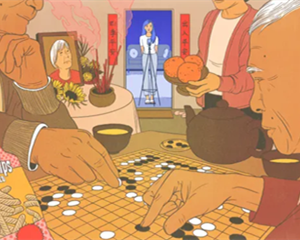My nainai was born to a landowning family in Jiangsu. Her surname was Shi, which means "stone", a stubborn word that suited her personality. In 1944, when she was not yet 16, she renounced her class and joined the army in service of the Communist party's cause. She had dry, sturdy hands that raised three generations of children. My cousins, relying on her long after they'd left home, would often leave their children, her great-grandchildren, in her care. She was fiery and straightforward, unpretentious to the core. On the other side of the ocean, my father often laughed at how you couldn't trust nainai to buy any clothes. One summer, in middle school, I grabbed a cigarette from her when she was playing mahjong and told her not to smoke. She laughed at me and pulled another cigarette from the packet.
奶奶出生在江蘇省的一個(gè)地主家里。她姓石,是“石頭”的意思,這個(gè)詞很硬,很適合她固執(zhí)的性格。1944年,未滿16歲的奶奶放棄了自己的階級參了軍,為共產(chǎn)黨的事業(yè)服務(wù)。她有一雙干練的手,養(yǎng)育了三代子孫。我的表兄弟姐妹們離開家后很長時(shí)間都在依靠她照顧,他們的孩子,也就是她的曾孫,也常常由她來照顧。她熱情直率而又樸實(shí)無華。在大洋的另一邊,我的父親經(jīng)常嘲笑我,他說奶奶真的從來不買衣服,你怎么能不信呢?記得我在上中學(xué)的一個(gè)夏天,奶奶在打麻將,我從她手里奪過一根煙,讓不要抽煙。她對我笑了笑,然后又從煙盒里抽出一支煙。
On the last day of our interviews, after I turned off the microphone, she put a hand on my wrist and started talking again. She said that in her life, she had just been an ordinary person. Not extraordinary at anything. And with a personality like a boy's. But she'd always tried to help others. Whether she had money or not, if there was something she could do, she did it. So even though she was just a low-level cadre in the civil system, people liked her. They all came to give her greetings at New Year. She was known for being diligent at work. She wasn't selfish. That was how she'd lived her life.
在我們采訪的最后一天,我關(guān)掉麥克風(fēng)后,她把一只手放在我的手腕上,然后又開始說話了。她說,在我的一生中,我都只是一個(gè)普通人,沒有什么特別的地方。奶奶有著男孩子的性格,不過她總會(huì)盡力幫助別人。不管自己有沒有錢,只要她能幫她都會(huì)去幫。所以,雖然奶奶只是民事系統(tǒng)中的低層干部,但是大家都很喜歡她,都會(huì)過來給她拜年。奶奶工作勤奮是出了名的,她從不自私自利。奶奶的一生就是這么過來的。

After she died, I shared the recordings of my interviews in the family WeChat group. My uncle, who had been in Indiana and was also unable to physically attend the funeral, thanked me. "I cried hearing her voice again," he said.
奶奶死后,我在微信家庭群里分享了我的采訪錄音。我的叔叔當(dāng)時(shí)在印第安納州,也沒能親自參加奶奶的葬禮,他對我表示感謝。“又聽到了她的聲音,我哭了,”他說。
Later, he pointed out how basic my questions had been. "That interview – you don't understand Chinese history at all, though!"
后來,他指出我問的問題太基礎(chǔ)了。“那個(gè)采訪——只能說明你對中國的歷史一點(diǎn)兒都不懂!”
He probably didn't realise how this hurt me, but oh, it hurt. It was another reminder of how I didn't really "belong" with the people on the other side of the WeChat group. I had tried my best to keep up with the Chinese world, but time spent in one world was time spent away from my other one.
他可能沒有意識到這句話有多讓我傷心,真的很讓人傷心。它再次提醒我我并不真正“屬于”微信群另一邊的人。我已經(jīng)在盡力跟上中國的步伐了,但是活在另一個(gè)世界里的我又怎能了解這個(gè)世界的全部呢。











